'Every single farm has a story': Des Moines County farmer preserves family's heritage
Etched on the gravestone marking Ella and Carl Beckman's final resting place in northern Des Moines County's Prairie Grove Cemetery is a depiction of a quaint farmstead located less than a half-mile away.
"That was a picture of this farm in its heyday," Douglas Beckman said of the etching. "It's when the windmill was here and the big old barn was over here, and Ella had all this as garden over here all the way back to the tree line, which is impressive, I think."
The garden and the windmill are no more, and the large barn located just east of the milking barn was toppled by strong winds years ago. But the home that had been occupied by generations of Beckmans still stands.
"It's kind of cool how many Beckmans started out on planet earth in that house," Douglas said on a recent morning in the milking barn on the homestead that was recognized this summer as one of Iowa's Century Farms.
Between feeding cattle and tending to crops, Beckman makes time for improvements on the two-bedroom home, which he plans to rent out once it's been brought back up to par.
Upstairs, crayon drawings likely done by Beckman's aunts and uncles still can be seen on one of the walls. On the floor of an adjoining room is a child's painting of a person that Beckman discovered while pulling up the carpet.
"When I redo these floors, I'd like to leave this," he said.
More:Christina Bohannan stresses support for labor during campaign stops in Burlington
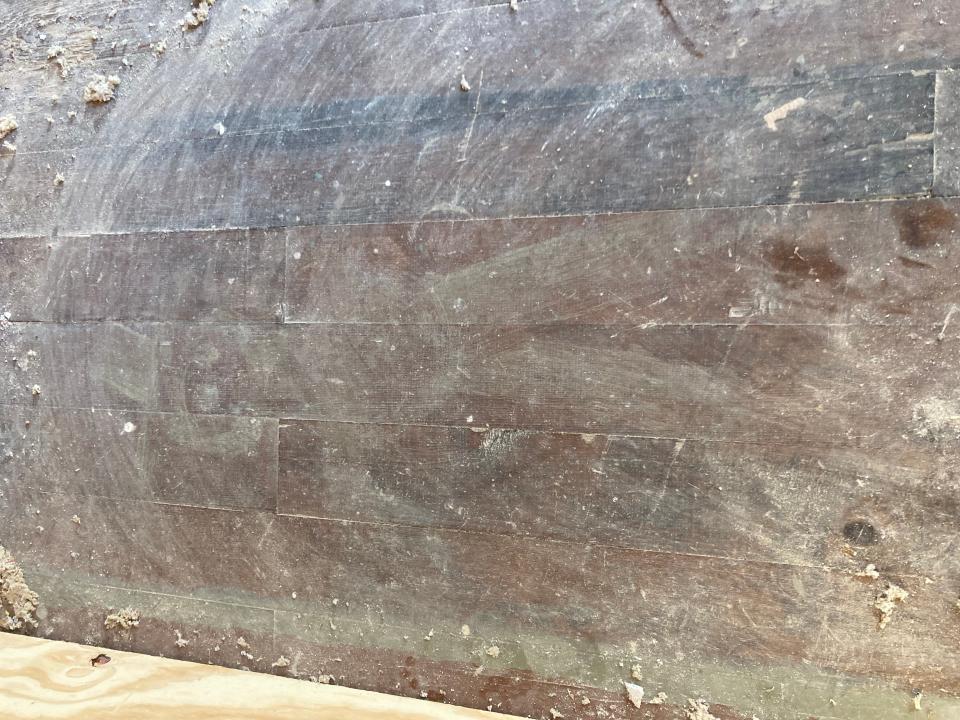
But his favorite feature of the home is a sound.
"Now you're going to have to close your eyes," he said before allowing a porch door to slam shut. "Does that sound like an old grandma house, like kids coming in the back door? I wonder how many times that door has slammed. That has a real familiar sound of a farmhouse."
Tracing the Beckman lineage to a great-great-grandfather
Beckman has more than one family tie to Beckman Dairy Farm and the farmhouse at the front of the property.
The farm had belonged to George Beckman, the brother of Douglas's great-grandfather, Lewis, and the grandfather of Douglas's uncle, Robert, who, according to property records, owned the farm after Ella and Carl from 2001 until September 2020, when Douglas took over. George and Lewis were among eight children born to Douglas's great-great-grandfather, William Beckman, who lived there before Carl and Ella.
"There's another farm on the backside of this farm that all that's left is the barn," Douglas said. "That's where Walter Beckman lived, which would've been my grandpa's brother."
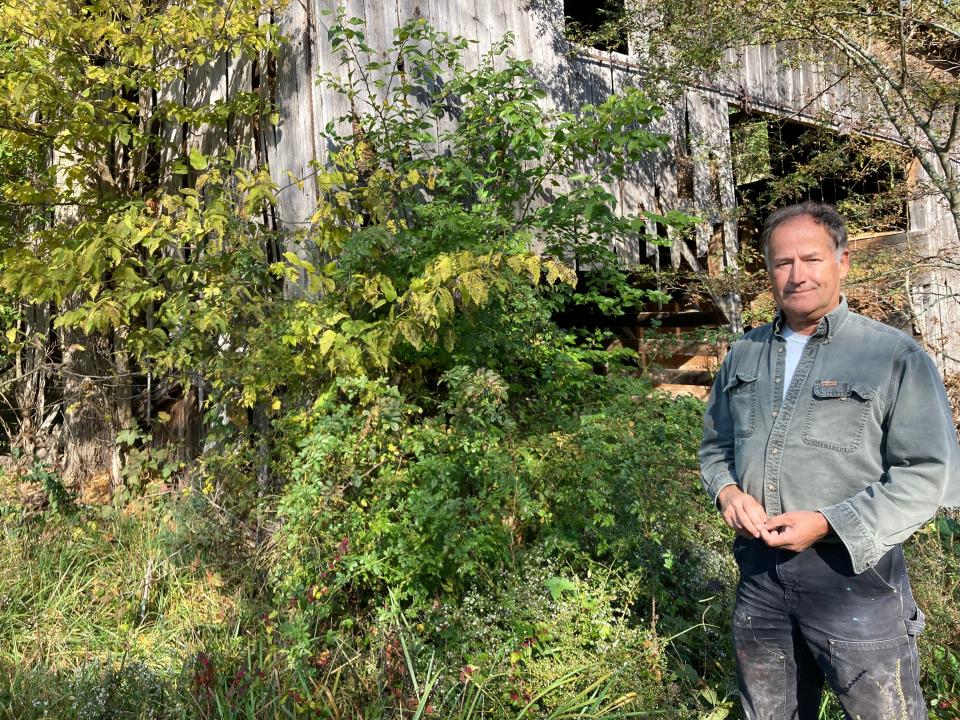
That barn is one of Beckman's favorite spots on the farm. It's nestled in a wooded area past land that until recently was used as cow pasture.
"A lot of cows have walked around back here, and they never farmed this," Beckman said while driving along a pathway he keeps cleared for use as a road alongside corn and bean fields. "This had been left in pasture till now. The first year farming it was 2021."
Beckman does raise cows, but he has no plans to resume the dairy operation at the Beckman Dairy Farm.
"You don't see too many dairy farms left," he said. "The price ran them out. Extensive and nonstop work and no pay, and then the younger generation, they're not going to want to do that, be committed and responsible for dairying, and society's changed, but you can't blame them. They're not going to want to be committed to a profession that they're not going to get a return on."
More:Community Health Centers of Southeastern Iowa taking over BHS health clinic
One man's work to clear the land his ancestors once did
Beckman single-handedly bulldozed out the land and the brush to expand the fields. The process took about a year, he said, explaining the ground needed to be sprayed and the grass and roots cleared to make way for crops. Farming the land over the next few years will need to be done carefully, as roots will continue to pose a threat to implements.
Clearing the land has been a challenging process, he said, but it's one he enjoys.
"This is what I would rather do than buy a farm that was ready to farm. I'd rather buy something I could work on," he said.
While the fields were expanded, Beckman made sure to leave in place wooded areas, much to the delight of a few deer and a group of turkeys that were enjoying the fall weather as his truck drove past them.
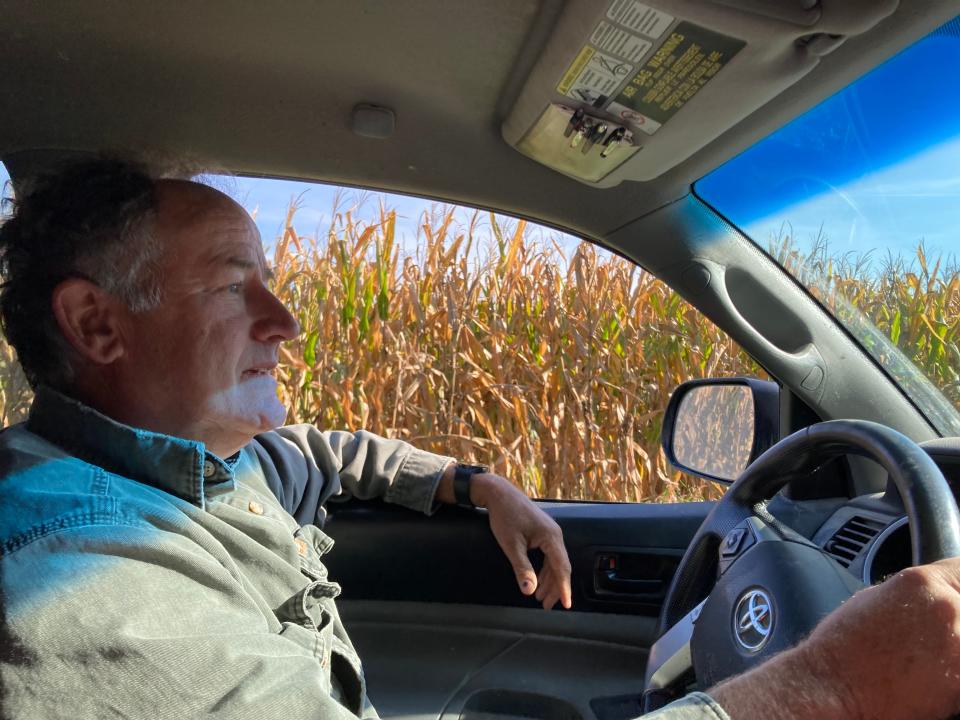
Upon reaching the end of the soybean field, Beckman pointed out the barn.
"Here's all that's left of Walter's barn," he said. "I think that's cool."
It is from that point that Beckman likes to take photos with his phone, though he noted he's not big on technology. From there, one can see the tops of the farm's remaining outbuildings and beyond, especially during the winter months when the trees are stripped of their foliage.
Signs of previous generations are everywhere: 'Leave the character to the farm'
Not far from the barn are remnants of a previous generation. There's a toppled windmill and the stone foundation of a home, inside of which is an old laundry machine.
"A whole life went on here," Beckman said. "Somebody asked me if I'm going to doze it off. No, I'm not that excited about getting every inch. Leave the character to the farm. That'd be a crime to erase this, I think. And it's level ground, of course. You could easily doze this off. There could be a corn row where we're standing, but no, let her be. You can't knock all the character off the farm. Then what do you have? Just an open field."
More:Terry Painter set to be inducted into Burlington bowling Hall of Fame
Beckman is unsure of what happened to the home, and he was pleasantly surprised to learn of its existence when he purchased the property after Robert Beckman put it to auction.
Douglas had spoken with Robert ahead of time about who the farm would go to, thinking more immediate family would be interested in the property. When he learned that was not the case, he decided to make his bid.
"I will not bid against a family member," he said. "But no family members did bid on it, so I said if you guys are not going to buy it, I'm going to buy it. It's a shame to let it go."
It was at auction that Beckman purchased another farm in which his family is deeply rooted.
"The Wehage Farm, that's an old German name," he said.
His family's history there began with Melvin and Carl Wehage, who were Beckman's grandmother's brothers.
"My grandma was the oldest of 12 on the Wehage farm," he said. "There's one baby girl I know of who's buried on that farm, so there's a lot of history there. I was told that they buried here to where Lou, her mother, could see her from her window, her grave. When you're looking at a farm and you're driving down the countryside, every single farm has a story to it when you start digging into it."
Beckman began farming the property with them on 50-50 shares in 1979. After Melvin and Carl died in 1988, Beckman bought it at auction, keeping it in the family.
"There was interest in the farm at that time, but not like there would have been today," he said.
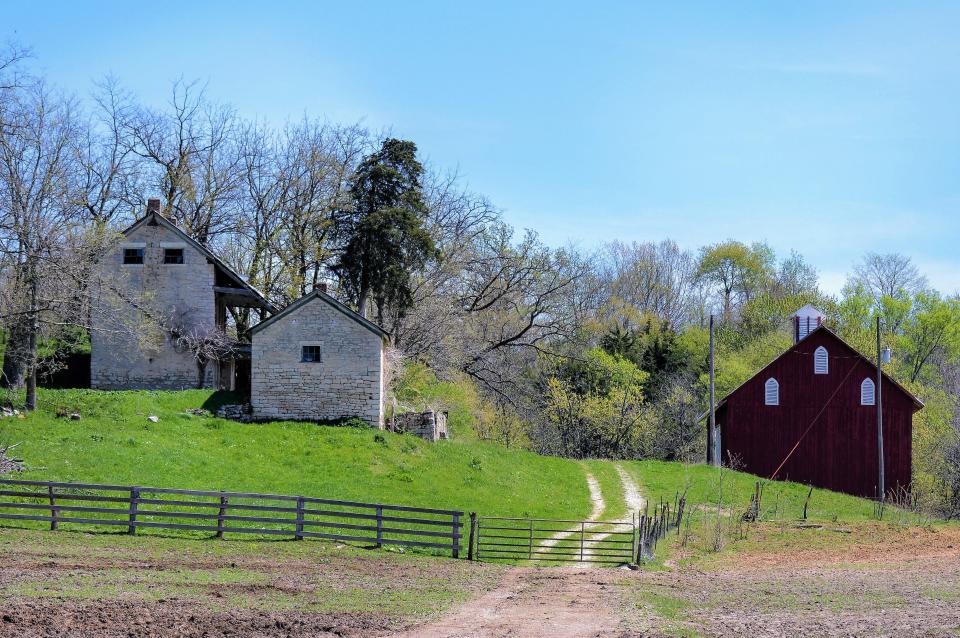
What it took to become one of 134 Century Farms in Des Moines County
In 2001, Beckman applied for the Iowa Department of Agriculture and Land Stewardship's Century Farms Program, which recognizes and honors those individuals who have owned the farm land for 100 years or more. It began in 1976 as part of the Bicentennial celebration, when more than 5,000 certificates and farm markers were distributed across Iowa at local ceremonies.
To be eligible for the program, the farms must have consecutive ownership within the family for at least 100 years, and the present owner must be related to a person who owned the land 100 years ago.
Recipients of the Century Farm designation receive one certificate and one marker. Awards are presented at a ceremony at the Iowa State Fair each August.
More:Iowa workers lose $900 million to wage theft per year, report finds
This past August, Beckman accepted a certificate and marker for the Beckman Dairy Farm.
"I think it's a good program," he said. "I think heritage needs to be valued. Once you lose it, you can't get it back."
Beckman now owns two of the 134 Century Farms in Des Moines County.
"I was thinking the other day about the Wehage Farm and this farm, and the Wehage Farm's been in my family for 120 years, and this one's been in my family 120 years, so there's 240 years of combined, same-family working," he said. "It's kind of awesome really when you think about it, because we can't wrap our mind around 240 years, but you think back, your same family has been around here for that many years.
"It's kind of neat if you find a piece of machinery or you find a piece that fell off of a horse-drawn implement or whatever, and you do every once in awhile. You think that might have been your great-grandpa that dropped that way back when, and here you are today, 2022 and you're picking it up, so I feel fortunate."

"It's such a neat thing that farms in this day and age can stay with families for this long," said Amber Lyons, Beckman's daughter. "At this point, it's really hard for someone who just wants to become a farmer and go out and buy a farm. It's kind of a hard thing with the way that land has rose in price and all of that, so generally, these farms are handed down, and that's how they stay within the families.
"The difference with my father is he's bought all of these on auction. This isn't something that has been handed to him. He has worked for every last acre that he owns. ... He has stood at an auction with a paddle and he has purchased and kept these things going. ... He's very humble. He doesn't want anyone to know what he does. I don't think he really understands just how important and special that is."
IDAL also has a Heritage Farm designation for those that have been family-owned for 150 or more years. There are far fewer of these farms, with only 24 in Des Moines County having been given that distinction.
Beckman doesn't know if his farms will remain in his family long enough to earn the Heritage Farm status.
"A lot of farms get built up and then they get melted down," he said. "And that's another reason the Century Farm program holds significance. They're pointing out the fact that it's been a long time, a lot of integrity here, and let's face it, farming's not an easy life. I think of farming not as a job. It's a culture. If you do it right, it's a culture for you. You live it."
The younger generation finds pursuits other than farming, but maintain fond memories
Beckman's children have pursued their own paths, not that he faults them for it given the stressors and hardships that come with farming, such as variations in crop yield and price, as well as the amount of work.
Still, Lyons, who opted to pursue business administration, sees the value in preserving her family's heritage. She said she and her siblings have fond memories of riding their bicycles to the Wehage Farm in the summertime. There, they would go inside the German-style limestone home and discover relics of previous generations.
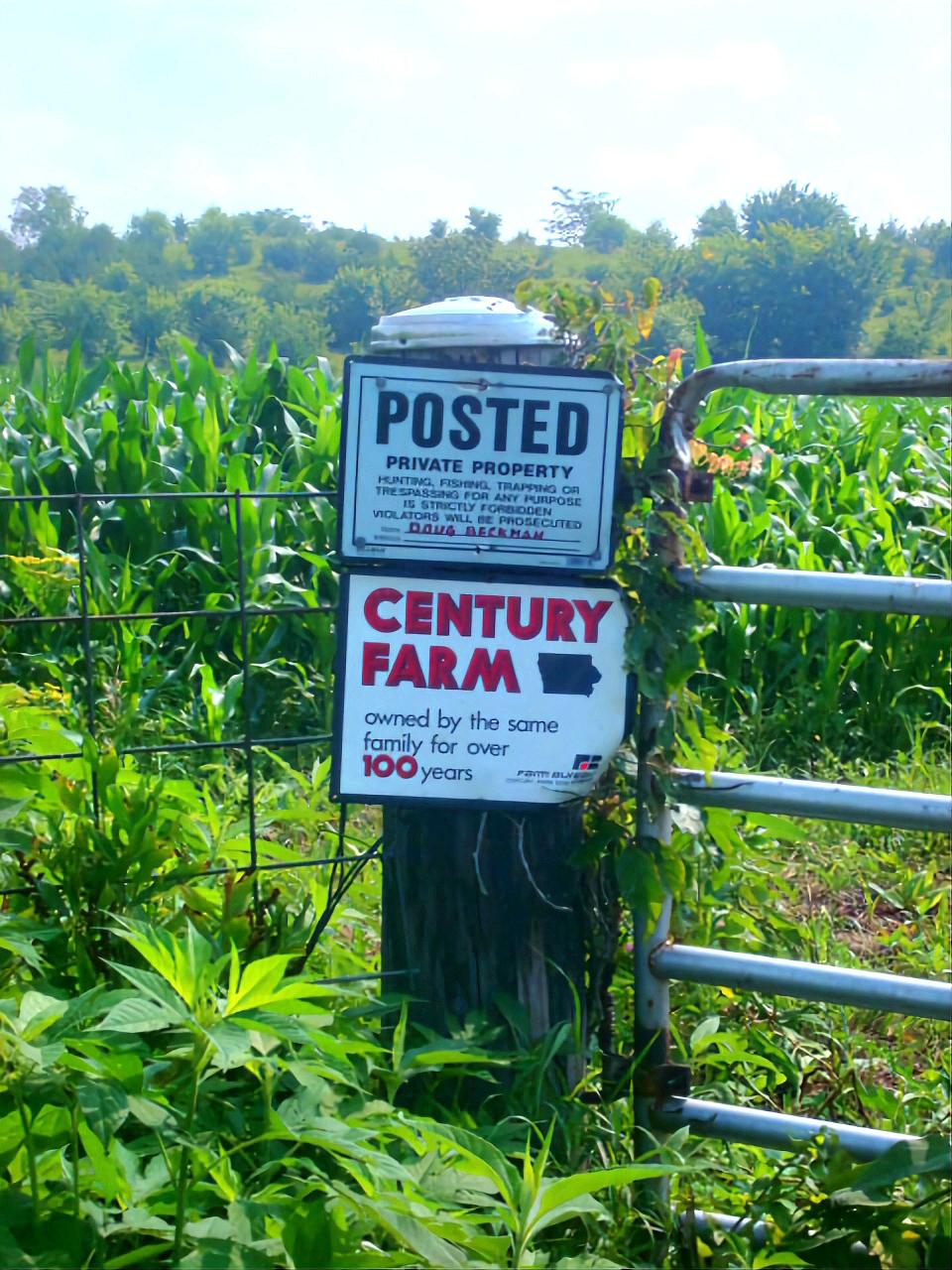
"When my dad bought it at auction, it was just completely full of the belongings that were left by our ancestors," she said, recalling finding things like sewing patterns and aerosol deodorant cans from the 1950s. "It was really kind of like a time capsule for us. ... That farm is very special to us."
The future of the farms has yet to be decided, but Beckman is hopeful that one of his grandchildren will carry on the family tradition of farming, a lifestyle he adopted at a young age while helping his grandparents.
"I think it's virtually impossible for a young person starting out today to get started," he said. "I think I was probably the last generation that you could've scratched your way in the door to get started. I don't know where you'd start today. Of course, the economy's changed. It's just a different world today."
This article originally appeared on The Hawk Eye: Des Moines County man maintains family heritage with Century Farms

